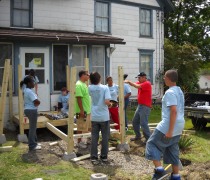The Community Improvement Through Youth (CITY) Project team presented a workshop entitled, A Workforce Grows in the CITY, on October 5 at the 2009 Association of New York State Youth Bureaus in Syracuse. The workshop focused on the ways in which the CITY Project intentionally integrates workforce readiness skills into the summer employment component of the CITY Project program plan. June P. Mead, Dept. of Human Development, is the CITY Project Director and Program Evaluator.
 Each summer, the CITY Teen Leaders are connected with paid summer employment and continue to implement or complete community improvement projects planned during the regular school year after school program. The teens are hired as employees by Cornell Cooperative Extension. They sign contracts that establish expectations for the employee-employer relationship. This past summer, the CITY Teen Leaders built a community garden, served as educators at the Discovery Center's Story Garden, refurbished a neglected open space in Endicott and created a community park, built a wheelchair ramp for a needy family (see photos), and conducted healthy lifestyles education and outreach program in New York City.
Each summer, the CITY Teen Leaders are connected with paid summer employment and continue to implement or complete community improvement projects planned during the regular school year after school program. The teens are hired as employees by Cornell Cooperative Extension. They sign contracts that establish expectations for the employee-employer relationship. This past summer, the CITY Teen Leaders built a community garden, served as educators at the Discovery Center's Story Garden, refurbished a neglected open space in Endicott and created a community park, built a wheelchair ramp for a needy family (see photos), and conducted healthy lifestyles education and outreach program in New York City.
The following table summarizes how the CITY Project is building the job skills that employers are looking for in today's workforce.
| Workforce Readiness Skills | CITY Project at Work |
| Problem Solving: Exercise sound reasoning and analytical thinking; use knowledge, facts, and data to solve workplace problems; apply math and science concepts to problem solving. | Problem Solving: Through intentionally planned, hands-on learning experiences, teens are given ample opportunities to learn and practice problem-solving skills. |
| Oral Communications: Articulate thoughts, ideas clearly and effectively; have public speaking skills. | Oral Communications: A centerpiece of the 4-H program is public presentations. CITY Teen Leaders are encouraged and supported to speak within group meeting and publicly. |
| Written Communications: Write memos, letters and complex technical reports clearly and effectively. | Written Communications: Public Adventures curriculum leads to concrete “real world” written documents such as mission statements, funding proposals, project budgets, and action plans. |
| Teamwork/Collaboration: Build collaborative relationships with colleagues and customers; be able to work with diverse teams, negotiate and manage conflicts. | Teamwork/Collaboration: The CITY Project emphasizes supports and opportunities for youth to experience a teamwork, collaboration with adult partners, a sense of efficacy, connectedness, and mattering. |
| Diversity: Learn from and work collaboratively with individuals representing diverse cultures, races, ages, gender, religions, lifestyles, and viewpoints. | Diversity: The CITY Project embraces cultural diversity through team-building activities and collaboration with diverse community groups to celebrate and demonstrate respect for diversity. |
| Information Technology Application: Select and use appropriate technology to accomplish a given task, apply computing skills to problem-solving. | Information Technology Application: The CITY Project integrates technology into the program by focusing on what teens want to do and using technology skills to carry out projects. |
| Leadership: Leverage the strengths of others to achieve common goals; use interpersonal skills to coach and develop others. | Leadership: Through intentionally planned, hands-on learning experiences, teens have ample opportunities to learn and practice leadership skills. |
| Creativity/Innovation: Demonstrate originality and inventiveness in work; communicate new ideas to others; integrate knowledge across different disciplines. | Creativity/Innovation: The projects undertaken are youth-determined and youth-led. Creativity is reflected in the unique ideas for the community projects that are undertaken. |
| Self-direction: Be able to continuously acquire new knowledge and skills; monitor one’s own learning needs; be able to learn from one’s mistakes. | Self-direction: Public Adventures focuses on creating opportunities for teens to be self-directing, autonomous, and empowered. |
| Work Ethic: Demonstrate personal accountability, effective work habits, e.g., punctuality, working productively with others, and time and workload management. | Work Ethic: The CITY Teen Leaders are hired as employees by Cornell for the summer. They sign contracts that establish expectations for the employee-employer relationship. |
| Social Responsibility: Demonstrate integrity and ethical behavior; act responsibly with the interests of the larger community in mind. | Social Responsibility: The CITY Project encourages and models warmth, closeness, connectedness, good communication, caring, support, and guidance. |
* Drawn from: Are They Really Ready To Work? Employers' Perspectives on the Basic Knowledge and Applied Skills of New Entrants to the 21st Century U.S. Workforce (2006) The Conference Board, Inc., the Partnership for 21st Century Skills, Corporate Voices for Working Families, and the Society for Human Resource Management. http://www.21stcenturyskills.org/documents/FINAL_REPORT_PDF09-29-06.pdf
The CITY Project is part of the Children, Youth and Families At-Risk (CYFAR) Program, Sustainable Community Projects (SCP). It is supported by Smith Lever funds, National Institute of Food and Agriculture (NIFA), U.S. Department of Agriculture.

